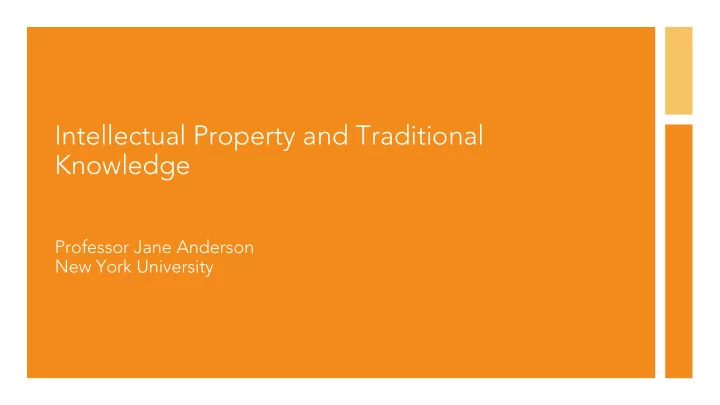

Intellectual Property and Traditional Knowledge Professor Jane Anderson New York University
1. What is Traditional Knowledge? Traditional knowledge (TK) is knowledge, know-how, skills and practices that are developed, sustained and passed on from generation to generation within a Tr community, often forming part of its cultural or spiritual identity.
2. Who are Traditional Knowledge Holders? Traditional or Indigenous knowledge is held individually and collectively by a family, community or multiple communities who are the authorities, custodians, holders, owners and/or creators and have responsibilities and obligations for access, transmission, circulation, and future use . Image: Passamaquoddy Tribe of Indians. Photograph Donald Soctomah. www.passamaquoddypeople.org
3. Recognizing Indigenous Peoples in International Law 1. 1957 International Labor Organization Convention 107 2. 1989 International Labor 1989 International Labor Organization Convention 169 Organization Convention 169 Conventions concerning the Protection and Integration of Indigenous and Tribal and other semi- Tribal Populations in Independent Countries
4. Intellectual Property and Traditional Knowledge 1967 Revision of Berne Convention in Stockholm Inclusion of many more states post WWII Meetings between 1962-1967 in Africa and Asia on new category ‘folklore’ and traditional knowledge. • Inclusion of Article 15(4) in Berne Convention (unknown authors) • WIPO established • Inclusion of Protocol Regarding Developing Countries 1975 Tunis Model Law for Developing Countries (WIPO + UNESCO) 1985 Model Provisions for National Laws on the Protection of Expressions of Folklore Against Illicit Exploitation and Other Prejudicial Actions (WIPO + UNESCO) 2000-2018 WIPO Intergovernmental Committee on Intellectual Property and Genetic Resources, Traditional Knowledge and Folklore
International v National Treatment
Nagoya Protocol On Access to Genetic Resources and the Fair and Equitable Sharing of Benefits Arising from their Utilization to the Convention of Biological Diversity
Declaration on the Rights of Indigenous Peoples
National Treatment Australia Peru Bolivia Fiji Vanuatu Panama New Zealand Phillipines United States Republic of Azerbeijan India South Africa Namibia
Equity, Ethics, Responsibility and Collaborative Stewardship TK futures are about relationships How and where do principles of international law align with TK holders interests? Multiple strategies are needed
Thankyou Jane.anderson@nyu.edu Localcontexts.org
Recommend
More recommend